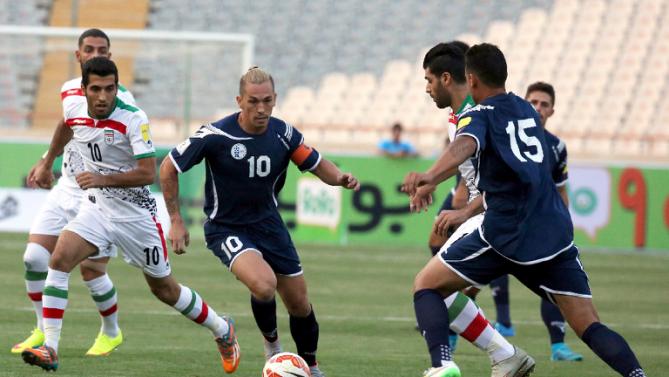Guam’s Iran match bigger than the game

Pacific Daily News – HAGATNA, Guam will host Iran in a World Cup Qualifying match on Tuesday. A victory for the Matao keeps hope alive of advancing to the next round of the tournament and a loss all but assures their elimination, but for those involved the match is only part of the story. In many ways, it’s a small part.
During a press conference Monday, Iran head coach Carlos Queiroz was asked about, of all things, the artificial turf the match will be played on. His response, naturally, dug below the surface.
“After many years in the game, I’ve been all over the world,” Queiroz said.
“I’ve had the opportunity to see many, many things in this world. I’ve coached in Asia and Africa, in Europe and America. I think and I feel that tomorrow, (the players on both teams), it’s their duty to have a good fight on the pitch, try to play the best football that is possible, but at the end of the day we’ve come in some difficult times all over the world. Just look at the television. We don’t want to bring more dust for a sports environment.
“These boys tomorrow, they have a game. They must play with each other, try to win the game as much as possible, have a good fight on the pitch, but at the end, we must reach this goal, … to make football a better place — a field where all the boys and girls want to walk and run and play.”
The Iran team traveled to Guam, a U.S. territory, during a time when fear and hostility is impossible to ignore. Politically, the two nations don’t interact. To travel from one to the other means first finding some middle ground, an intermediate country that will sponsor the visas.
Guam went through that process in September when they competed in Iran. It was hectic and rushed. It didn’t go according to plan and, less than a week before the match, it remained possible they wouldn’t be allowed to enter Tehran to play. The whole team did.
Iran had similar, if not multiplied, troubles coming here. Several of their key players were denied visas and aren’t with the team. Competing in a soccer game is one of the few ways such travel is possible at all.
The two teams want to compete hard, but a physical play may be seen as more than that.
“It’s going to be a fight,” Matao captain Jason Cunliffe said.
“At the end of it, I hope that they know they were in a battle.”
Cunliffe said his team won’t avoid confrontations on the pitch any more against Iran than they do against every other opponent — “If it’s anything like that, it’s because I don’t want to get a red card” — but the battle on the field will purely be one of soccer skill. The mutual respect is too great for anything else.
‘Amazing experience’
Tensions were high before the Matao played in Iran. The players weren’t sure what to expect until they arrived and discovered it wasn’t everything they’d seen on TV.
“It was an amazing experience,” Cunliffe said. “Some things the media has a different idea of what life is like on the ground.”
There was cultural adjustment. They were careful where to look when they walked around town, and the male-only crowd in the stadium was disarming. Added to the pressure of representing Guam and the U.S. in Iran, then competing against the top-ranked team in Asia, led to a slow, cautious start.
“In Tehran, I think we showed them a little bit too much respect and that was reflected in the result,” Cunliffe said of the 6-0 loss.
The Matao were cautious, careful about how they played, aware not only of their talented opponent’s ability to score quickly, but of their political responsibility as representatives of the U.S.
That is in play now, with the roles reversed. Iran arrived in Guam a few days before the match to train, acclimate themselves to the time and weather and see a new, unfamiliar place that’s only been shown to them on TV.
“I hope that they’ve been treated with the utmost respect and kindness, like anyone who comes to Guam,” Cunliffe said.
‘Complete privilege’
Iran captain Andranik Teymourian knows he is representing his team and his country on U.S. soil, and he’s proud to do it.
“It’s a complete privilege to represent Iran,” he said. “One-hundred percent.”
The difficulties of the trip — from obtaining visas to jet lag to playing on artificial turf — have weighed heavily on him, but he said the team is confident, comfortable and focused.
During the press conference and after, he declined to comment on any of the challenges, saying they’ve already been talked about too much.
“We came here to play football and we’re not going to think about anything else but football,” he said through a translator.
During the press conference, Queiroz and Matao head coach Gary White stressed the importance of the game as an opportunity to grow soccer and share the positive impact the sport can have.
The young players and fans in the crowd will watch and know they can grow up to compete against the best team in Asia, which Iran is.
They will also see two teams that worked through challenges beyond their control just to get on the field a play a game, growing a sport and respect between nations where the opportunity to do that is extremely limited.
“If two countries like this can get together and play a sport in a good way, it shows what is possible,” White said.
“… This is bigger than politics. It’s about the kids and the sport and the future.”




